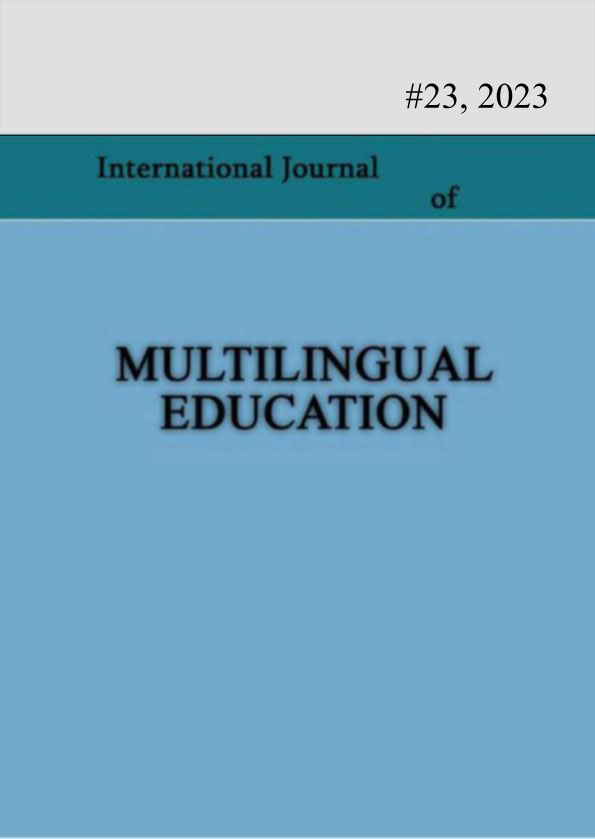Exploring University Instructors' Perceptions of Poetry as a Catalyst for Cultural Learning in Language Education
Keywords:
Perceptions of Poetry, linguistic and cultural competencesAbstract
Problem Statement: This research addresses the gap in understanding the perceptions and challenges of university language instructors regarding the integration of poetry as a tool for enhancing intercultural understanding within language education. Purpose: This study aims to uncover the perceptions of university instructors on the potential of poetry to serve as a bridge between linguistic competence and cultural competence. By exploring their beliefs, experiences, and challenges in incorporating poetry into language
lessons, the study seeks to illuminate the pedagogical opportunities and obstacles that arise. Research Methods: The research methodology employed in this study aligns with a qualitative approach, which seeks to delve into the complex perceptions and experiences of university language instructors concerning the integration of poetry as a facilitator of intercultural understanding within language education. Semi-structured interviews, a cornerstone of qualitative research, have been selected as the primary data collection technique. Through these interviews, language instructors are provided with an open yet focused platform to articulate their insights, beliefs, challenges, and experiences related to the incorporation of poetry in language instruction. Upon the completion
of the interview phase, the gathered data will undergo a rigorous process of content analysis. Content analysis is a systematic and iterative method that involves the identification, coding, and categorization of themes and patterns present within the transcribed interview data. By meticulously examining the textual content, significant themes will be extracted, allowing for a comprehensive exploration of instructors' perceptions, motivations, apprehensions, and strategies regarding the use of poetry for intercultural understanding. This analysis process will enable the researchers to uncover both explicit and implicit insights within the data, revealing
the intricate nuances of the instructors' viewpoints. Main Results: The findings will shed light on how poetry can effectively be integrated into language instruction and provide a nuanced understanding of instructors' motivations and apprehensions. The implications of this research extend to both theoretical and practical dimensions of language education.
References
Alber-Morgan, S., Sheila R., Hessler, T., & Konrad, M. (2007). Teaching writing for keeps.
West Virginia: West Virginia University Press.
Aydinoglu, N. (2013). Integration of poetry with vocabulary teaching. Mediterranean Journal of Educational Research, 14(a), 274-284.
Carter,R. (2007). “Literature and language teaching 1986-2006: a review”, International Journal of Applied Linguistics, 17(1), pp. 3-13.
Chanmann-Taylor,M., Bleyle, S., Hwang,Y., and Zhang, K. (2016). “Teaching poetry in TESOL teacher education: heightened attention to language as well as to cultural and political critique through poetry writing”, TESOL Journal, doi:10.1002/tesj.263.
Collie, J. and S. Slater. 1990. Literature in the Language Classroom: A Resource Book of Ideas and Activities. Cambridge: CUP.
Creswell, J.W. (2011). Educational research: Planning, conducting, and evaluating quantitative and qualitative research (4th Ed.). Pearson.
Davis, J. H. (2008). Why our schools need the arts. New York, NY: Teachers College Press. Duff,A. and Maley, A. (2007). Literature (Second Edition), Oxford University Press, Oxford. Eka Mulatsih, M. (2018). Learning poetry as a strategy to develop students’ teaching skills.
International Journal of Indonesian Education and Teaching, 2, 120-128.
Downloads
Published
How to Cite
Issue
Section
License
Copyright (c) 2023 Uyumaz Abdullatif, Gezder Tuncay, Çelik Merve, Bıyıklı Edanur

This work is licensed under a Creative Commons Attribution-NonCommercial 4.0 International License.
Copyright (c) - Authors who publish with this journal agree to the following terms: Authors retain copyright and grant the journal the right of first publication with the work simultaneously licensed under a Creative Commons Attribution-Noncommercial 4.0 International License, which allows others to share the work with an acknowledgement of the work's authorship and initial publication in this journal. Authors are permitted and encouraged to post their work online (e.g., in institutional repositories or on their personal website) prior to and during the submission process, as it can lead to productive exchanges, as well as earlier and greater citation of published work (see The Effect of Open Access). Authors may enter into separate, additional contractual arrangements for the non-exclusive distribution of the journal's published version of the work (e.g., post it to a repository or publish it in a book), with an acknowledgement of its initial publication in this journal.

